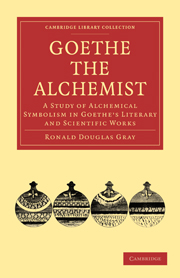IX - Homunculus
Published online by Cambridge University Press: 10 November 2010
Summary
The quest of the Philosophers' Stone was in itself a wildly ambitious project. Equally ambitious, however, was the idea that it was possible to create little creatures, homunculi, similar to men in every respect, but produced by artificial means. There seems to be no doubt that the alchemists sincerely believed in the possibility of such a miracle, and some went so far as to claim success. Since Goethe also made use of the same idea in the Second Part of Faust–at a stage, in fact, following almost immediately the scene of the ‘Mothers’, just discussed–there is good reason to examine here some of the alchemists' beliefs concerning this aspect of their work, and to attempt an interpretation of its meaning.
Firstly then, as to the method by which homunculi were said to be created. The most widely known passage describing this, and that from which Goethe is generally supposed to have derived his own Homunculus is that in the first book of Paracelsus' work, Of the Nature of Things. It occurs in a section dealing with generation of all kinds, showing how everything, not only human beings and plants, but minerals and rocks as well, is created by the conjunction of two sexes. From this, Paracelsus proceeds to ‘the generation of Artificiall men’, and seeks to demonstrate that this can be accomplished in the same manner.
- Type
- Chapter
- Information
- Goethe the AlchemistA Study of Alchemical Symbolism in Goethe’s Literary and Scientific Works, pp. 205 - 220Publisher: Cambridge University PressPrint publication year: 2010First published in: 1952
- 1
- Cited by



